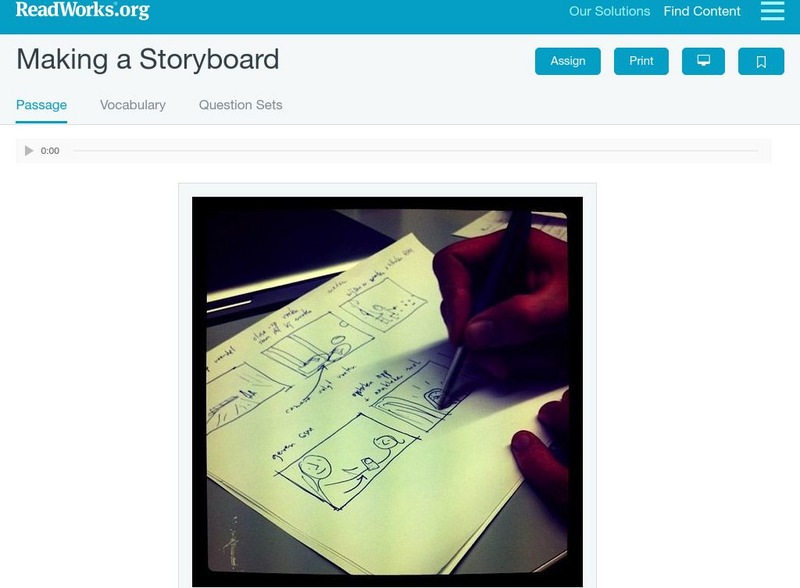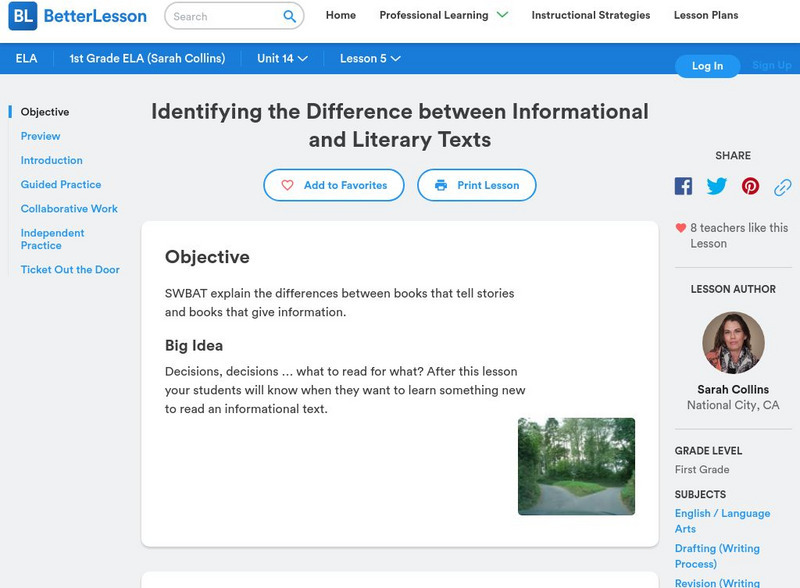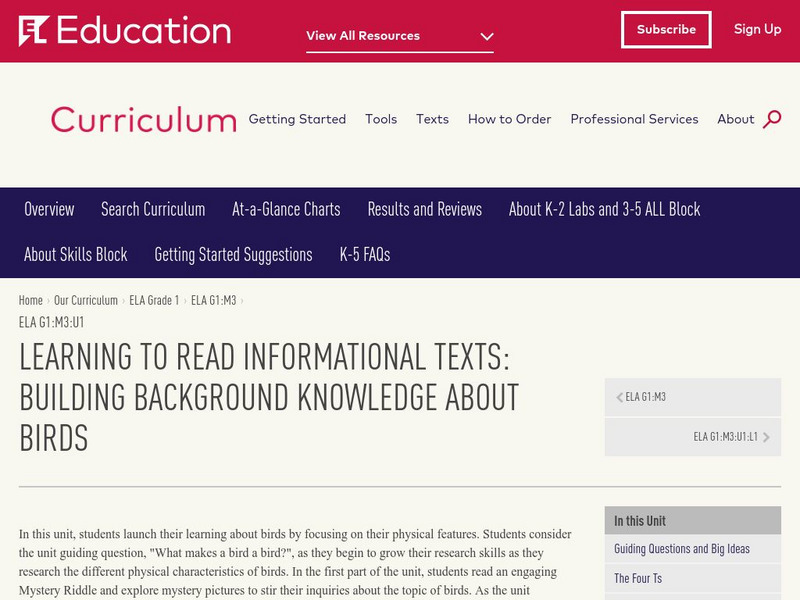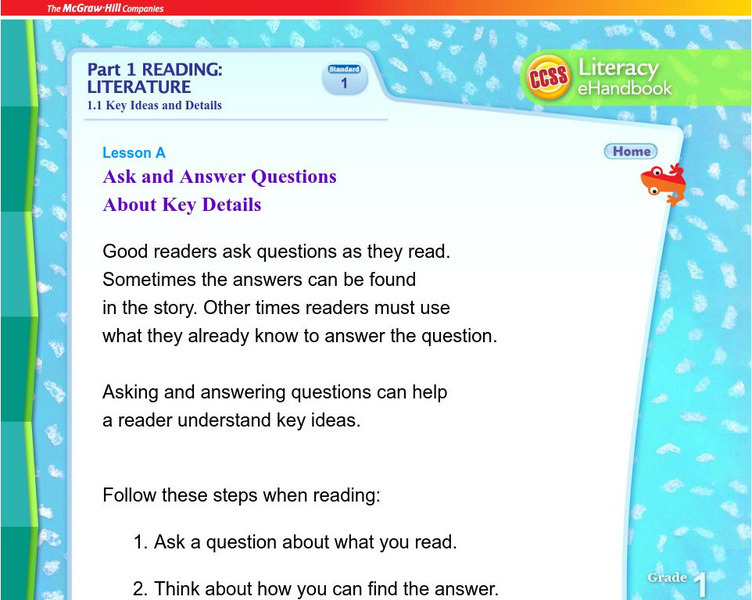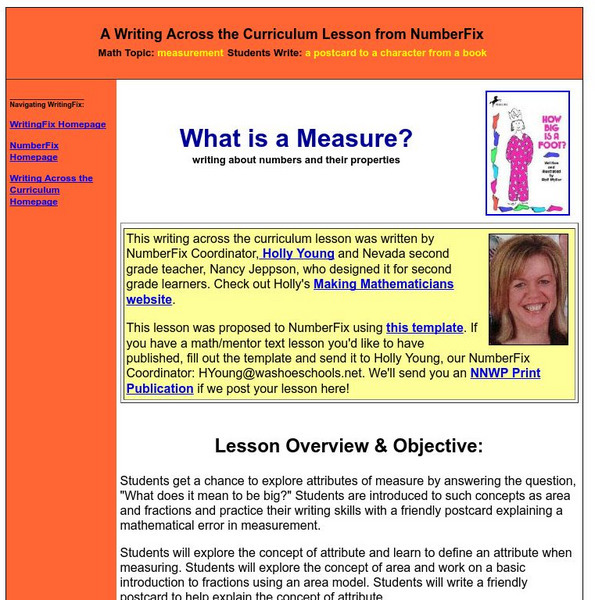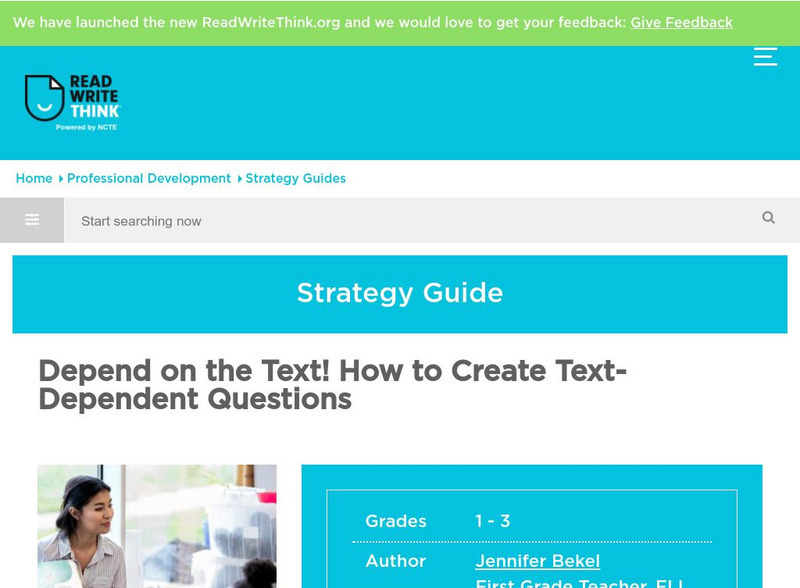Curated OER
Bread in a Bag
This lesson focuses on making bread, but also spends some time on the origins of wheat. In order to make the bread, each class member receives a kit full of the materials they will need. Included here is a detailed list of instructions...
Read Works
Read Works: Passages: Making a Storyboard
[Free Registration/Login Required] Students read a nonfiction text about a girl whose aunt is a children's book author and answer questions about comprehension, sequencing, supporting details, main idea, vocabulary, and more. Links to a...
Read Works
Read Works: Lesson: Author's Purpose: Cause and Effect Signal Words
[Free Registration/Login Required] With this lesson plan, students can learn how several authors can write about the same topic, but for different purposes.
Utah Education Network
Uen: Grade 2 on Demand Writing Samples
This resource is provided by the Vermont Writing Collaborative. Many examples of student's on-demand opinon writings are included. Students had been prompted to decide which kind of pet is best, a cat or a dog.
Better Lesson
Better Lesson: Guess My Solid
Descriptive details are used as students develop a guessing game poster for others to try and guess their chosen solid. Included in this detailed lesson plan are videos, samples of student work, a printable worksheet, an assessment...
Better Lesson
Better Lesson: Identifying the Difference Between Informational and Literary Text
Students will learn the difference between books that tell stories and books that give information. Multiple videos of different level reading groups engaged in this lesson, along with a printable activity sheet are included.
EL Education
El Education: Learning to Read Informational Texts: Building Background
In this comprehensive unit, students launch their learning about birds by using informational texts. As students read these texts, they build background knowledge and develop their skills as readers of informational texts. Included are...
Better Lesson
Better Lesson: Finding the Author's Purpose
What is autism? How does it affect behavior? Students will find evidence of the author's tone or purpose for writing the article, as well as hints that show evidence of opinion. Includes a video clip from the movie "Rainman", and an...
Better Lesson
Better Lesson: Work Out Together
Students will read an article and determine the author's point and identify the reasons the author gives to support his or her point. This lesson requires analysis by the students and a great deal of higher-order thinking as they...
Better Lesson
Better Lesson: Identifying and Writing Opinions About Clouds Using Clue Words
It is important to teach students the difference between facts and opinions. This is the groundwork for getting students to think critically when analyzing a piece of text. This lesson will help to lay the foundation for opinion writing....
Better Lesson
Better Lesson: Text Feature Diagrams
At the end of this instructional activity, students will be able to identify and create diagrams associated with informational text. Included is a link to an eSpark video on diagrams, rules for group work, multiple examples of diagrams,...
Better Lesson
Better Lesson: Visual Representations in Informational Text
Students will look at examples of illustrations and diagrams in informational texts and discuss how each one helps enhance the text. Students gain the knowledge that sometimes a picture is worth a thousand words because a complex idea...
Better Lesson
Better Lesson: What Shapes the Land?
In this instructional activity, the teacher will read a book about different landforms. The children will learn about the features of the landforms and how they were shaped by natural forces. Then text features will be discussed. The...
PBS
Pbs Learning Media: Teacher's Guide: Xavier Riddle and the Secret Museum
Use this teacher's guide to plan how you'll integrate video clips, biosketch readers, and graphic organizers for Xavier Riddle and the Secret Museum across your Grade 1-2 classroom curricula. From guided reading to a living wax museum,...
Michigan State University
Michigan State University: Intervention for Reading: Story Grammar Training
This intervention emphasizes the importance of metacognitive or active reading strategies to improve comprehension. It directs students' attention on story structure by teaching them to ask five "wh" questions about the settings and...
Michigan State University
Michigan State University: Interventions for Reading: Reconciled Reading
This intervention, which is based on Schema Theory, engages students in enrichment activities prior to reading the passage. In this way, students have the opportunity to activate and enhance existing knowledge before reading....
Writing Fix
Writing Fix: If You Give a Student an Animal
In this lesson plan, the book If You Give a Moose a Muffin, written by Laura Numeroff, is used as a mentor text for word choice. The content focus of the lesson is to teach the young scholars to take ownership of scientific and...
Curated OER
Mc Graw Hill: Part 1: Reading Literature
Learn how asking and answering questions can help readers understand literature better. Site includes a model and an example of how to use this system.
ReadWriteThink
Read Write Think: Writing Abc Books to Enhance Reading Comprehension
Contains plans for four lessons that are adaptable to many texts that students may be reading. Students analyze the text for literary elements such as characters, setting, figures of speech, and themes, and then publish their findings in...
Quia
Quia: Literary Terms Quiz
In this self-scoring practice activity, students read four passages and select the main idea of each.
Read Works
Read Works: The Three Branches of Government
[Free Registration/Login Required] Intended for early elementary students, ReadWorks provides an information text about the three branches of government. A question sheet is available to help students build skills in reading comprehension.
Writing Fix
Writing Fix: What Is a Measure?
In this instructional activity, Rolf Myller's book entitled How Big is a Foot? is used as a mentor text. Students will answer the question, "What does it mean to be big?"The mathematical concepts of area, attributes, and fractions are...
ReadWriteThink
Read Write Think: Depend on the Text! How to Create Text Dependent Questions
This strategy guide focuses on writing text-dependent questions which require the student to reread the text to support their answers. It offers a list of what to do to create these questions that progress from establishing general...
ReadWriteThink
Read Write Think: Book Sorting: Using Observation and Comprehension
Critical thinking, comprehension and analysis skills are the focus of this physical activity. Good beginning to teaching different ways of looking at things.



